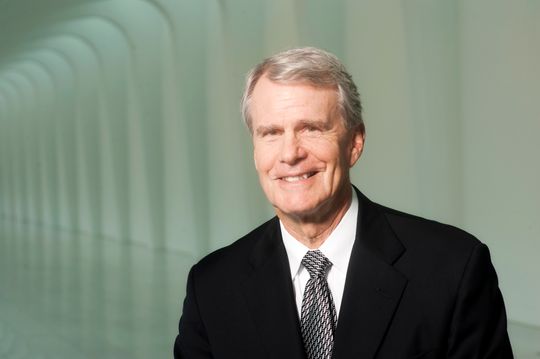According to the Journal Sentinel,
Bill Haberman had his hands, his mind and his heart in several of Milwaukee's biggest cultural efforts of the past 20 years, without putting his own name front and center.
"He's not a limelight guy," his son, Fred Haberman, said. "He's the guy behind the guy. He's the guy you can trust."
Bill Haberman, a longtime Milwaukee attorney and president of the Richard and Ethel Herzfeld Foundation for more than 20 years, died Saturday in Milwaukee of complications following two strokes he suffered last fall. He was 78.
As president of the Herzfeld Foundation, Haberman was deeply involved in efforts ranging from expanding the Milwaukee Art Museum to shoring up the finances of the Milwaukee Symphony Orchestra to co-founding Milwaukee Film. Under his leadership, the foundation was a key player in the capital campaigns for, among other projects, the Milwaukee Repertory Theater, the Milwaukee Symphony's new home in the former Warner Grand Theatre, the Milwaukee Ballet's new school and rehearsal facility and Milwaukee Film's renovations of the Oriental Theatre.
"You may not know Bill personally, but you have seen his contributions all over Milwaukee," Milwaukee Rep managing director Chad Bauman wrote on Facebook. The Rep plans to dedicate Friday's opening-night performance of "Things I Know to Be True" to Haberman. "… From Milwaukee Film's acquisition of the Oriental Theatre to Milwaukee Ballet's new building to the Milwaukee Art Museum's new addition, his fingerprints are all over this city."
But Haberman's impact was as deeply felt on a personal level, said Jonathan Jackson, CEO and artistic director of Milwaukee Film. Haberman and his wife, Carmen, were co-founders of the organization that runs the Milwaukee Film Festival and, since last year, the Oriental.
Bill and Carmen, who is vice president of the Herzfeld Foundation, became "deep personal mentors to me, and became friends outside of the office," Jackson said. "They helped teach me the history of Milwaukee, and nonprofit leadership."
He added that Bill Haberman also emphasized a "spirit of humor and good fun," something that he thought was essential in work and in life.
Bill Haberman was born on April 20, 1940, in Princeton, N.J.; his father, Frederick W. Haberman, was teaching there. In 1947, Frederick Haberman joined the faculty at the University of Wisconsin-Madison, where he was a communication arts professor and, later, chairman of the Athletic Board.
At Michael Best, he became a sought-out expert on estate planning. Among his clients were Richard and Ethel Herzfeld, who created their foundation with money from the sale of Milwaukee-based Boston Store in 1948, where Richard Herzfeld had been president.
The Herzfelds had lost a child "very early," Fred Haberman explained, and his father "basically became their adopted son." He was on the foundation's board, and, when Ethel Herzfeld died in 1997 (Richard had died 17 years earlier), became its president.
The foundation focused its efforts on arts and culture, education, and civic improvements.
After Ethel Herzfeld's death, the Herzfeld Foundation's asset base expanded from $2.7 million to $65 million.
A star golfer, football and basketball player in high school, Bill Haberman also was a star academically, his son said. After graduating with a degree in history from UW-Madison, Bill went to Harvard Law School, returning to Wisconsin and joining the law firm of Michael Best & Friedrich in Milwaukee.
According to the foundation’s 2017 IRS filing, the foundation had assets of nearly $80 million. In its most recent annual report online, the Herzfeld Foundation's 2018 contributions included $6.25 million for arts and culture programs, including $2.7 million toward the Milwaukee Ballet's capital campaign, and nearly $2.23 million for arts education, civic projects and education.
By all accounts, Haberman made sure the foundation's role wasn't passive. He often took leadership roles, some of them behind the scenes, to help nurture the groups getting the foundation's funding.
Mark Niehaus, president and executive director of the Milwaukee Symphony, said in a statement that Haberman's influence was felt particularly in support of the symphony's K-12 education programming, and "as a business leader who was invaluable as a guiding voice that assisted the orchestra in shaping its strategic planning and long-term growth."
As chairman of what is now the Wisconsin Policy Forum from 2006-'09, Haberman "provided a strong guiding hand and left our organization in even stronger condition than when he arrived," the forum said in a statement Monday.
Milwaukee Film's Jackson said Haberman played a key role in bolstering the organization's financials when it was starting out. He also reinforced "the importance of ethical financial leadership and stewarding that properly."
"He was so amazed at the generosity of people and the importance of an organization like ours, a nonprofit, being an amazing steward" of those gifts, Jackson said.
Haberman was also "curious about how the world worked," his son Fred said. "Even though he was an incredible intellectual, he was an optimist. … He had an imagination that then manifested itself through so many things that he did."
"Above all," Milwaukee Ballet artistic director Michael Pink said via email, "Bill possessed a brilliant mind, and the courage to be unashamedly passionate about endeavors he supported, whilst remaining engaged in other people's projects that affect the city we live in, and beyond."
In addition to his interests in sports and the arts, Haberman loved music, especially listening to — and singing — the songs of Frank Sinatra, but his tastes weren't limited. His son Fred said that, last week, "I was talking to him and he said he was listening to Neil Young."
"He was OK with being himself. He looked for the authenticity in people because he was authentic himself," Fred said.
In addition to his wife, Carmen, and son Fred, Bill Haberman is survived by his daughter, Sarah Haberman; two grandchildren, Celeste and Clayton; and Bill's sister, Ann Armstrong.
A service is still being planned, Fred said, and likely to be held in early April.




